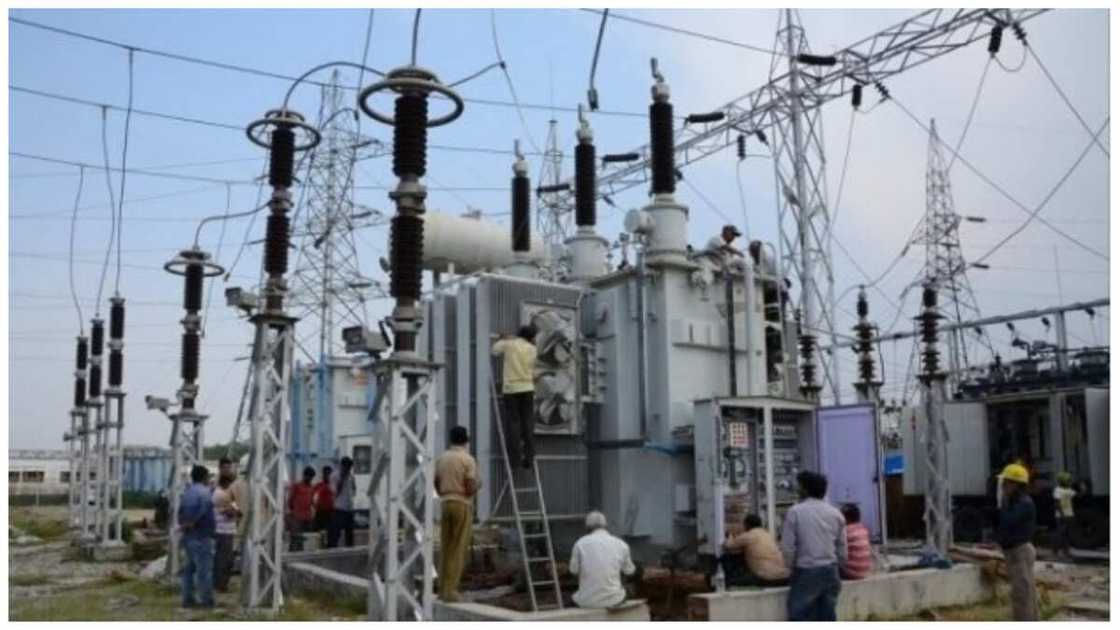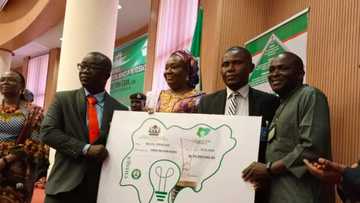Nigerians Lament Poor Electricity Supply Despite Power Generation Peaking at 4,735.1MW
- Power generation in Nigeria peaked at 4,735.1MW on Sunday, November 6, 2022, to the relief of stakeholders in the power sector.
- Despite the increase in power generation, many parts of the country continue to grapple with an epileptic power supply
- "Whenever the light comes, we don't even expect it to last longer than 3 hours," says a consumer in Lagos
PAY ATTENTION: Click “See First” under the “Following” tab to see Legit.ng News on your Facebook News Feed!
Power generation in Nigeria rose to 4,735.1 megawatts on Sunday, November 6, 2022, showing a 3% increase from 4,594.6MW recorded last week.
This is according to a report by the Nigeria Electricity System Operator, an organisation under the Transmission Company of Nigeria (TCN). According to Vanguard, the body is responsible for operating the transmission system.
Even though power generation has experienced a slight improvement for the most part of 2022, it is still lower than the 5,000MW target by the Federal Government.
The report indicated that lead generators which contributed to the surge in generation across the country include Egbin Power, Delta Power, Azura-Edo IPP, Iroro Hydro, Kainji Hydro, Odukpani NIPP and Jebba Hydro.

Source: Facebook
PAY ATTENTION: Subscribe to Digital Talk newsletter to receive must-know business stories and succeed BIG!
What some Nigerians are saying about power supply
In many parts of the country, the power supply is still widely epileptic as they get to experience power for not more than 3-4 hours a day. In some places, power can be gone for two straight days.
Tunde Akinyele told Legit.ng that the electricity issue in his locality has become unbearable as he never gets to have power whenever he returns from work in the evening. He said:
In Akute area (Lagos), light has become a luxury for us. Whenever the light comes, we don't even expect it to last longer than 3 hours. It doesn't stop the electricity distribution companies from showing up with outrageous electricity bills at the end of each month. Last October, the bill they sent to me, for a 2-bedroom flat was N28,000. I wonder how they expect us to pay that range of amount when there's hardly ever enough light.

Read also
Iluromi Emmanuel: FG rewards teacher who invented technology to track fuel usage in vehicles
Another electricity consumer in the Ipaja area, John Ojo, who spoke with Legit.ng said that he has come to accept the unfortunate situation by relying more on his inverter. He said:
When I gave up on constant electricity, I decided to invest in an inverter. Even though it did cost me a lot to purchase and set up, I seem to have peace of mind and know that for the period I'm home, there's a source of power supply and I don't have to pay for electricity that I do not even use.
Despite an Unreliable Power Supply, Nigeria Exports Electricity to Benin, Niger
Legit.ng reported two months ago that despite the epileptic power supply in Nigeria, the country sells about 6% of electricity generated to its neighbours, Benin Republic and Niger.
Nnaemeka Ewelukwa, managing director of Nigerian Bulk Electricity Trading (NBET), he assured that selling electricity when the country doesn't have enough is strategic.
While addressing the house of representatives committee on finance and explaining why Nigeria sells electricity to other nations when it does not have enough for its citizens, Ewelukwa said the transactions are more driven by specific generation companies like the Niger Delta Power Holding Company (NDPHC).
He said that if Nigeria does not provide electricity for these countries, it could spell trouble for Nigeria if these countries go ahead and build their own dams.
Electricity is an essential need for Nigerians and the poor supply continues to negatively affect businesses and livelihood forcing many to rely on generators that are powered by diesel and petrol, the cost of which keeps increasing every now and then.
Others who are more financially buoyant have set up inverter systems in their homes in order to save themselves the headache of epileptic power supply and outrageous electricity bills and frequent tariff increases by electricity distribution companies.
Source: Legit.ng




